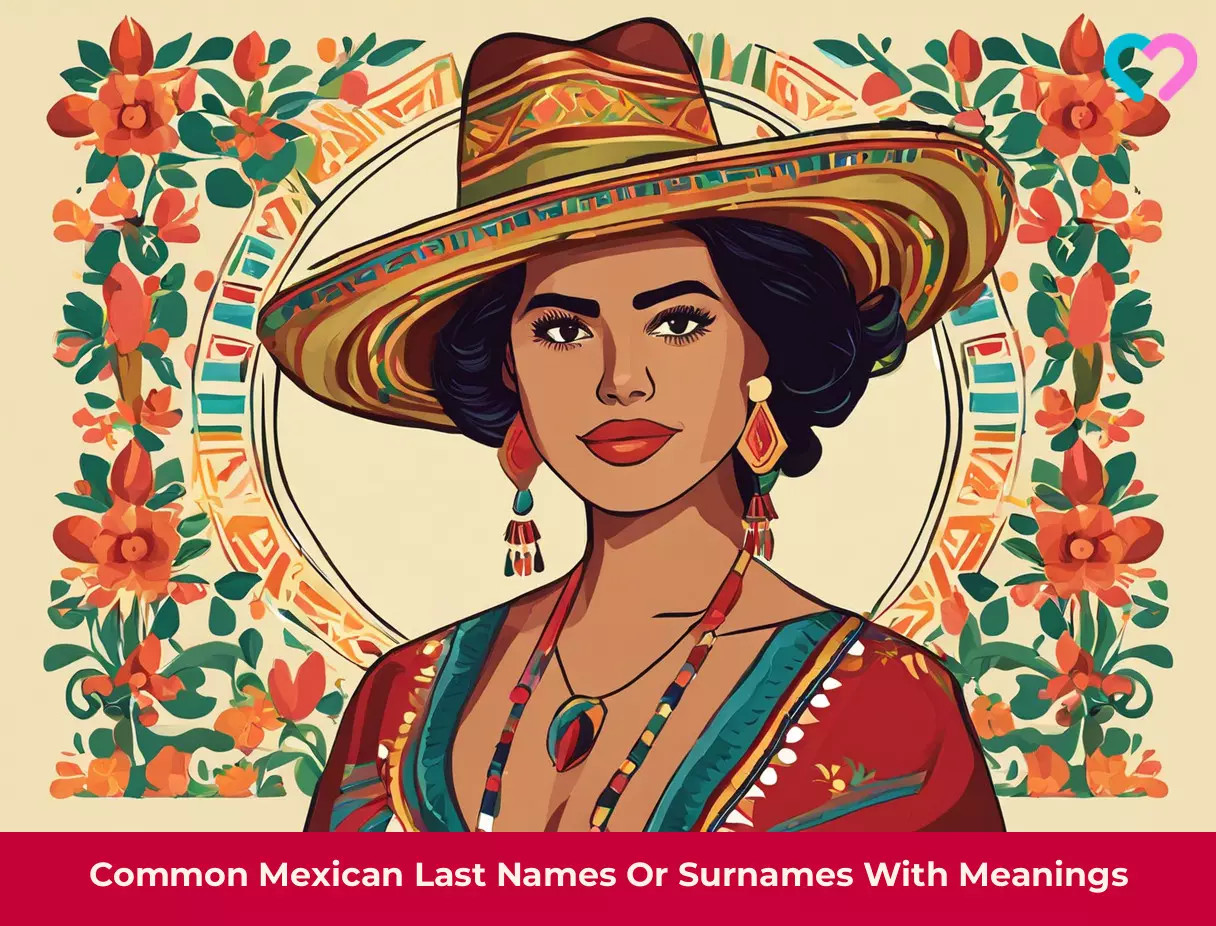 Mexican Last Names For Babies
Mexican Last Names For Babies
Mexico, a vibrant country with a rich history, is home to the largest Spanish-speaking population in the world (1). Reflecting this heritage, the most Common Mexican Last Names are deeply rooted in Spanish origins, having either directly derived from Spain or evolved from Spanish nomenclature.
A distinctive aspect of Mexican culture is the practice of inheriting two last names. The first surname is taken from the father’s paternal lineage, while the second comes from the mother’s paternal line. This tradition ensures the continuity of both family names for at least two generations. Furthermore, parents in Mexico have the choice to select either the father’s or the mother’s last name to be the primary surname for their child. Delving into the cultural significance of these common Mexican last names unveils a rich tapestry of heritage that stretches back to the Spanish colonization of Mexico. This historical backdrop profoundly influences not only the surnames themselves but also the identities of those who bear them.
This article explores a compilation of the most common Mexican last names, providing insights into their meanings and historical origins, perfect for those interested in genealogy, cultural studies, or simply curious about Hispanic naming traditions.
Key Pointers
- The most famous Mexican surnames are predominantly of Spanish origin, a legacy of Spain’s historical colonization of Mexico.
- A defining characteristic of Mexican last names is the common usage of two surnames, one inherited from the father and the other from the mother.
- Many common Mexican last names, such as Cuevas, Herrera, Molina, and Osorio, are recognized for their connections to geographical locations and ancestral occupations.
Naming Conventions In Mexico
Mexican naming conventions adhere to Spanish customs. Individuals are given personal names followed by two surnames: the father’s paternal surname and the mother’s paternal surname. While individuals might have multiple personal names, often the first given name is primarily used. The father’s surname typically functions as the main surname. Upon marriage, women may traditionally modify their names by adding their husband’s paternal surname, preceded by ‘de,’ as exemplified by ‘Maria López de Ayala.’ The preposition ‘de,’ meaning ‘of,’ can also serve to clarify surname lineage and avoid ambiguity. Occasionally, ‘y’ (meaning ‘and’) or ‘e’ (used before words starting with ‘i’ or ‘hi’) is inserted between the maternal and paternal surnames to ensure the paternal surname is not mistaken for a middle name, as seen in historical examples like Pedro de Góngora y Argote or Luis Dato e Iradier (2).
History Of Mexican Surnames
Mexican surnames are a fascinating blend of Indigenous, African, and Spanish influences, charting a course through centuries of cultural interaction and transformation. Before the Spanish arrived in 1519, surnames were not part of Mexican Indigenous cultures. The land was inhabited by diverse groups, including Aztecs, Maya, and Mixtecs, who used personal names often linked to calendar dates, natural elements, or significant life events.
The Spanish colonization period, from 1519 to 1821, brought about a significant shift in naming practices. European naming conventions were imposed on the Indigenous population, leading to the adoption of compound surnames—both maternal and paternal—and the Christianization of first names as many Indigenous people converted to Christianity. During this era, four primary categories of surnames began to emerge, laying the foundation for many common Mexican last names we recognize today:
- Patronymic surnames: These surnames are built from a father’s name, signifying lineage. Examples include Hernandez (son of Hernando) and Martinez (son of Martin), where the suffix ‘-ez’ denotes ‘son of.’
- Geographical surnames: These surnames are derived from places of origin, often indicating where families originally lived. Examples are Navarro (from Navarre) and Castilla (from Castile), regions within Spain.
- Occupational surnames: Reflecting ancestral professions, these surnames tell of family trades. Herrera (blacksmith) and Molina (mill worker) are classic examples, pointing to the occupations of ancestors.
- Descriptive surnames: These surnames originated from physical traits or characteristics. Moreno (dark-skinned) and Pacheco (small) are descriptive surnames that were initially used as nicknames that became hereditary.
Over time, the intermingling of Spanish and Indigenous cultures led to the creation of hybrid surnames, further enriching the lexicon of common Mexican last names. For example, the Indigenous name Moctezuma evolved into Montezuma. Individuals might also combine a Spanish first name with an Indigenous surname to preserve their native heritage, such as Juan de Xochimilco. Enslaved Africans also contributed to this diverse mix, adding their surnames to the evolving Mexican onomastic landscape. Post-independence, as Mexico continued to assimilate various cultures, surnames of European, Middle Eastern, and Asian origin also became integrated into Mexican naming practices. Thus, common Mexican last names today are a testament to a complex history of colonization, cultural fusion, and the enduring resilience of native identity.
Patronymic Mexican Last Names
Patronymic surnames, derived from ancestral lineage, stand out as some of the most widely used common Mexican last names. Rooted in the tradition of naming individuals based on their father’s name, these surnames provide a direct link to familial ancestry.
1. Alvarez
Alvarez is a patronymic surname meaning ‘son of Alvaro.’ The name Alvaro itself is of Visigothic origin, meaning ‘all wise’ or ‘all guard,’ and it symbolizes traits of wisdom and protection.
2. Bernal
Bernal is the Spanish variant of the name ‘Baruch,’ a Hebrew name meaning ‘blessed.’ As a patronymic surname, Bernal signifies ‘son of Baruch,’ carrying connotations of blessing and favor.
3. Diaz
Diaz is a popular Spanish surname with a dual origin. In its Castilian form, it is patronymic, meaning ‘son of Diego.’ However, in its Latin root, it is derived from a word meaning ‘days.’ This surname is famously associated with the legendary Spanish hero El Cid, whose full name was Rodrigo Diaz de Vivar (3).
4. Dominguez
Dominguez means ‘son of Domingo.’ Domingo is the Spanish form of the name ‘Dominic,’ which originates from the Late Latin name ‘Dominicus’ meaning ‘of the Lord,’ giving the surname religious undertones.
5. Enriquez
Enriquez signifies ‘son of Enrique.’ Enrique is the Spanish equivalent of ‘Henry,’ a name of Germanic origin. It combines ‘Heim’ meaning ‘home’ and ‘ric’ meaning ‘power’ or ‘ruler,’ suggesting a heritage of domestic power or leadership.
6. Flores
Flores is a surname with Spanish, Portuguese, and Italian roots. Originating in the kingdom of Asturias, it is patronymic, meaning ‘son of Fruela’ or ‘son of Froila,’ both derived from the Latin word for ‘flowers,’ evoking nature and beauty.
7. Gomez
A widely recognized Hispanic surname, Gomez is patronymic, meaning ‘son of Gome.’ It originates from the Visigothic word ‘guma,’ which simply means ‘man,’ representing a basic yet fundamental ancestral link.
8. Gonzalez
Gonzalez is a highly prevalent Spanish surname, especially common Mexican last name, also widespread in South American countries. It is patronymic, meaning ‘son of Gonzalo,’ a name thought to mean ‘noble warrior,’ ‘castle guard,’ or ‘battle elf,’ suggesting a lineage of nobility or military valor.
9. Gutierrez
Gutierrez is a distinctive Spanish surname, patronymic in origin, meaning ‘son of Gutierre.’ Gutierre is derived from Walter, a Germanic name meaning ‘he who rules,’ denoting a heritage of leadership and authority.
10. Hernandez
Hernandez means ‘son of Hernando.’ Hernando is a Spanish variant of Fernando or Ferdinand, which has Old German origins. It combines ‘fardi’ meaning ‘journey’ and ‘nand’ meaning ‘daring’ or ‘brave.’ The name gained popularity through King Ferdinand III of Castille and León, a key figure in Spanish history. The Hernandez family name’s history can be traced back to the 1600s (4).
11. Jimenez
Jimenez means ‘son of Jimeno.’ Jimeno is a variant of ‘Simon,’ which is likely derived from the Basque word ‘seme’ meaning ‘son,’ making it a double patronymic in a sense.
12. Juarez
Juarez is a well-known patronymic surname, meaning ‘son of Suero.’ It has Spanish origins, rooted in the ancient Visigothic word ‘surhari,’ meaning ‘southern army,’ possibly indicating ancestral ties to military service in the south.
13. Lopez
Lopez signifies ‘son of Lope.’ Lope comes from the Latin word ‘Lupus,’ meaning ‘wolf.’ The name is believed to have arrived in Spain during the Roman era and later journeyed to Mexico with Spanish colonization (4).
Trivia
American singer Jennifer Lopez prominently carries this common Mexican last name.
14. Marquez
Marquez means ‘son of Marcos.’ Marcos is derived from the Latin name ‘Marcus,’ associated with ‘Mars,’ the Roman god of war, suggesting a link to strength and valor.
Trivia
The Portuguese variant of this surname is ‘Marques.’
15. Martinez
Martinez is a patronymic surname meaning ‘son of Martin.’ Martin originates from Mars, the Roman god of war. The surname Martinez was introduced to Spain by Christians in the 4th century, eventually making its way to Mexico (4).
16. Mendez
Mendez means ‘son of Menendo.’ Menendo comes from the old Visigothic name ‘Hermenegildo,’ which in Old German meant ‘complete sacrifice,’ carrying connotations of dedication and commitment.
17. Munoz
Munoz signifies ‘son of Muno.’ Muno may be related to the Spanish word ‘monte,’ meaning ‘hill’ or ‘mountain,’ possibly indicating an ancestral connection to mountainous regions.
18. Ortiz
Ortiz is a Spanish patronym of ambiguous origins, meaning ‘son of Orti.’ Orti could mean ‘brave’ or ‘strong’ in Basque, or ‘fortunate’ in Latin, providing multiple interpretations of ancestral character.
19. Perez
Perez, a common Mexican last name, is a Spanish patronym meaning ‘son of Pedro.’ Pedro is the Spanish form of Peter, derived from Latin meaning ‘rock’ or ‘stone,’ symbolizing steadfastness and reliability.
20. Ramirez
Ramirez means ‘son of Ramiro.’ Ramiro originates from the Old German name ‘Ramirus,’ combining ‘ragin’ meaning ‘counsel’ and ‘mari’ meaning ‘fame.’ Thus, it means ‘famous counselor’ or ‘famed judge,’ suggesting a lineage of wise advisors or respected judges.
21. Resendiz
Resendiz is derived from the personal name ‘Resendes,’ which is composed of Germanic elements ‘reths’ meaning ‘advice’ or ‘counsel,’ and ‘sinths’ meaning ‘path’ or ‘way,’ indicating a family history associated with guidance or direction.
22. Reyes
Reyes is a uniquely Spanish surname, directly translating to ‘kings.’ It likely denotes ‘royals’ or ‘royalty.’ It is most probably a patronymic or metronymic surname, indicating descent from or association with royalty.
23. Rodriguez
Rodriguez, one of the most popular common Mexican last names, is patronymic, meaning ‘son of Rodrigo.’ It comes from the name Roderick, or the Germanic hrodrik, meaning ‘famous power.’ Originating in Germany in the 13th century, its use as a surname in Spain dates back to the 16th century (4).
24. Ruiz
Ruiz means ‘son of Ruy.’ Ruy is a shortened form of ‘Rodrigo,’ which is derived from ‘Roderick.’ Roderick is of Old German origin, combining ‘hrod’ meaning ‘renowned’ and ‘ric’ meaning ‘power,’ similar in origin to Rodriguez.
25. Sanchez
Sanchez is the patronymic form of Sancho, a name prevalent in medieval Spain. It means ‘true’ or ‘holy’ and is an ancient surname, tracing back over 1,300 years, suggesting a heritage of truthfulness or piety.
26. Tellez
Tellez signifies ‘son of Tello.’ Tello is derived from the Latin ‘tellus’ meaning ‘earth’ or ‘land,’ possibly indicating an ancestral connection to land ownership or agriculture.
27. Vasquez
Vasquez means ‘son of Vasco.’ Vasco comes from the old Spanish name ‘Velasco,’ meaning ‘crow’ or ‘raven,’ perhaps originally a nickname based on dark hair or features, or associated with the characteristics of a raven.
28. Velasco
Velasco is derived from the personal name Belasco combined with Basque elements ‘bel’ meaning ‘raven’ and the diminutive suffix ‘-sco.’ It directly relates to the meaning ‘raven’ in Basque.
29. Velazquez
Velazquez means ‘son of Velasco,’ where Velasco means ‘crow’ or ‘raven’ in Basque, continuing the avian theme and patronymic tradition.
Toponymic/Habitational Mexican Surnames
Toponymic, geographical, or habitational surnames are derived from place names, indicating where families originated or resided. These common Mexican last names are incredibly popular and offer a glimpse into the geographical history of families.
30. Aguilar
Aguilar was first found in Castile, a significant medieval Christian kingdom in Spain. It refers to someone from a region named Aguilar. The name comes from the Latin word ‘Aquilare’ meaning ‘eagles’ lair,’ suggesting a place known for eagles.
31. Aguirre
Aguirre denotes someone from any of several places characterized by open spaces or pastures. It is derived from the Basque word ‘Ager’ meaning ‘prominent’ or ‘exposed place,’ indicating an origin in open landscapes.
32. Alvarado
Alvarado is both a toponymic and habitational surname, from several places in Spain with this name. It means ‘white land’ or ‘bright land,’ possibly describing the soil or terrain of the ancestral homeland, perhaps near a dry or chalky hill.
33. Arellano
Arellano refers to a place named Arellano in the Navarre region of Spain. It originates from the Latin name ‘Aurelianus’ meaning ‘farm or the estate of Aurelius,’ indicating a connection to a Roman-era estate.
34. Ayala
Ayala is a toponymic surname for someone from the town of Ayala/Aiara in the Basque country of Spain. It is derived from Basque elements ‘ai’ meaning ‘hillside’ or ‘slope’ and ‘alha’ meaning ‘pasture,’ describing a hilly pasture landscape.
35. Barrera
Barrera is the Spanish word for ‘barrier.’ As a surname, it refers to a family that lived by a gate, fence, or any other barrier, possibly indicating residence near a significant boundary or landmark.
36. Cardenas
Cardenas is the feminine plural of the Spanish word ‘Cardeno’ meaning ‘purplish-blue.’ It is toponymic, also the name of a village in La Rioja, Spain, likely named for its purplish-blue flowers or landscape.
37. Castaneda
Castaneda is a toponymic surname referring to any of several places named Castaneda in Spain. It comes from the Spanish word ‘castaña’ meaning ‘chestnut,’ likely indicating a place abundant with chestnut trees.
38. Castellanos
Castellanos denotes a place inhabited or founded by ‘Castilians,’ people from Castile. The name is derived from the Latin word ‘castellum’ meaning ‘castle,’ indicating a settlement associated with Castilian origins or castles.
39. Castillo
Similar to Castellanos, Castillo is a habitational surname meaning ‘castle,’ denoting someone who lived by a castle or fortified building. This Spanish-turned-common Mexican last name originates from the Latin word castellum, with the same meaning.
40. Castro
Castro means ‘castle’ in Spanish. It comes from the Latin word ‘castrum,’ which also means ‘castle.’ This surname is famously associated with Fidel Castro, the Cuban revolutionary leader (5).
Trivia
‘Chester’ is the English equivalent of Castro.
41. Cervantes
Cervantes is a toponymic name for someone from a place called Cervantes in Spain. It is likely derived from the Latin word ‘serviens’ meaning ‘to serve’ or could refer to a servant. The surname is famously associated with Miguel de Cervantes, the renowned author of Don Quixote (6).
42. Cisneros
Cisneros originated from the place Cisneros in the Palencia province of Spain. It is derived from the Spanish word ‘cisne’ meaning ‘swan,’ perhaps indicating a place frequented by swans.
43. Contreras
Contreras refers to families from the region of Conteraras in Burgos, Spain. The place name is derived from the Late Latin word ‘contraria’ meaning ‘surrounding region,’ suggesting a location in a surrounding or opposite area.
44. Cruz
Cruz, a popular Spanish-language surname meaning ‘cross,’ is topographical for someone living near crossroads, or habitational for someone from a place named La Cruz. It can also signify the Christian cross, holding religious significance.
45. Cuevas
Cuevas means ‘caves’ in Spanish. It is a toponymic name for someone who lived near or in a cave, or from places named Cuevas in Malaga and Burgos, Spain, indicative of a dwelling near caves.
46. de Leon
De Leon denotes someone from the city of Leon in Spain. ‘Leon’ is the Spanish word for ‘Lion,’ indicating origin from the city of Leon, named after the animal.
47. Espinoza
Espinoza is a variant of ‘Espinosa,’ derived from the Spanish word ‘Espinoso’ meaning ‘thorny,’ possibly indicating a place overgrown with thorny bushes.
48. Estrada
Estrada, with Spanish, Galician, and Portuguese origins, means ‘paved road.’ It is a topographical surname for those living near a road or paved way, indicative of residence by a major path or road.
49. Figueroa
Figueroa comes from several places in Galicia, Spain. It is derived from Portuguese ‘figueira’ or Spanish ‘higuera,’ both meaning ‘fig tree,’ pointing to a place abundant in fig trees.
50. Gallego
Gallego is the Spanish word for ‘Galician,’ meaning someone from the Galicia region of Spain, a straightforward toponymic surname indicating regional origin.
51. Garcia
Garcia comes from the Galician word for ‘bear’ or ‘young bear.’ The surname is linked to a Spanish kingdom in Navarre during the Middle Ages. Besides Spain and Mexico, Garcia is common Mexican last name used in other Hispanic countries (4).
52. Guzman
Guzman is toponymic, referring to someone from the village of Guzman in Burgos, Spain, directly indicating village origin.
53. Ibarra
Ibarra is toponymic for those from the town of Ibarra in Basque country, Spain. ‘Ibar’ in Basque means ‘meadow’ or ‘valley,’ describing a place in a meadow or valley setting.
54. Lara
Lara is toponymic for someone from Lara de los Infantes in Burgos, Spain, directly indicating origin from this specific town.
55. Leon
Leon is toponymic for someone from the city of Leon in Spain, simply indicating city of origin.
56. Lugo
Lugo is toponymic for someone from the city of Lugo in Galicia, Spain, straightforwardly indicating origin from Lugo.
57. Luna
Luna is toponymic, derived from several places named Luna in Spain. It comes from Latin ‘luna’ meaning ‘moon,’ perhaps indicating places named for their moonlit aspect or Roman moon goddess temples.
58. Mata
Mata is Spanish for ‘bush’ or ‘shrubs.’ Likely toponymic for someone living near bushes or shrubs, or in a place named Mata, describing the local vegetation.
60. Medina
Medina is toponymic for someone from any of many places named Medina in Spain. It is derived from Medina, a city in Saudi Arabia, brought to Spain by Arabic influence, indicating a connection to places reminiscent of the Arabian city.
61. Mendoza
Mendoza, of Basque origin, is geographical, meaning ‘cold mountain.’ It likely referred to those living near a cold mountain or from colder climates, describing a geographical or climatic origin.
62. Montiel
 Montiel, popular Mexican surname
Montiel, popular Mexican surname
Montiel comes from Spanish ‘monte,’ meaning ‘hill’ or ‘mountain.’ It is toponymic for someone from various places named Montiel in Spain, indicating origin from a mountainous or hilly area.
63. Montoya
Montoya is likely from ‘monte’ meaning ‘mountain’ in Spanish. This toponymic surname was the name of several Spanish towns and villages, indicating origin from one of these places.
64. Morales
Morales is topographical, from Spanish ‘moral,’ meaning ‘mulberry tree.’ Mulberry cultivation was historically significant for the silk industry in Spain (7), so the surname may indicate residence near mulberry trees or involvement in silk production.
65. Murillo
Murillo is derived from Spanish ‘muro’ meaning ‘wall.’ It is toponymic for someone from any of the places named Murillo in Spain, possibly indicating residence near a wall or defensive structure.
66. Navarro
Navarro denotes someone from the Navarre region in Spain. ‘Navarre’ is derived from Basque, likely meaning ‘a valley or plain of people,’ directly indicating regional origin from Navarre.
67. Olivares
Olivares is toponymic for someone from any of the places named Olivares in Spain. It is from Spanish ‘olivar,’ meaning ‘olive grove,’ indicating origin from a place abundant with olive trees.
68. Orozco
Orozco refers to a place named Orozco in Basque country, Spain. The name was adopted by those originally from this region, directly linking to the Orozco region.
69. Ortega
Ortega is a Spanish habitational surname meaning ‘from the village of Ortega,’ referring to several villages with this name. ‘Ortega’ means ‘nettle,’ a common plant, or ‘black grouse,’ suggesting places named after these natural elements.
70. Palacios
Palacios means ‘palace’ in Spanish. It was originally adopted by those living near a palace or mansion, indicating residence near a prominent building.
71. Parra
Parra is Spanish for ‘vine,’ denoting someone living near grapevines.
Trivia
Parra is also a Jewish last name for people with winemaking ancestors.
72. Peralta
Peralta is toponymic from places called Peralta in Spain. It comes from Latin ‘petra alta’ meaning ‘high rock,’ indicating origin from a place on or near a high rock or cliff.
73. Pineda
Pineda is for those from places named Pineda in Spain. It originally refers to ‘pine forest,’ indicating origin from or near a pine forest.
74. Quintero
Quintero is a variant of ‘Quinteiro’ from Galicia, Spain. ‘Quinteiro’ is Galician for ‘yard’ or ‘farmstead,’ referring to someone living in or near such places, indicating a farmstead origin.
75. Ramos
Ramos is toponymic for someone living in a thickly wooded region. It is from Latin ‘ramus’ meaning ‘branch,’ describing a place with many branches or trees.
76. Rios
Rios was adopted by families living along a river. It is from Spanish ‘rio’ meaning ‘river,’ simply indicating residence by a river.
77. Robles
Robles is Spanish for ‘oak tree.’ It is toponymic for someone residing near oak trees, or in a place named Robles, indicating association with oak trees.
78. Rocha
Rocha is related to Spanish ‘roca,’ meaning ‘rock.’ It denotes someone living near a cliff or from places named Rocha in Spain, indicating a rocky or cliffside origin.
79. Rivera
Rivera, a popular topographic surname, denotes ‘riverbank.’ Of Spanish and Italian origin, it indicated those living by a riverbank, straightforwardly indicating residence by a river.
80. Rosales
Rosales is Spanish for ‘rose bushes.’ It refers to someone living near rose bushes or from places named O Rosal and El Rosal in Galicia, Spain, indicating association with roses.
81. Rosas
Rosas is plural of ‘rosa,’ meaning ‘rose’ in Spanish. It is toponymic for someone from several places named Rosas in Spain, indicating origin from a place named for roses.
82. Salazar
Salazar is toponymic from Salazar Valley in Navarra, Spain, a common Mexican last name. In Basque, Salazar means ‘old farmhouse.’ Its surname origin is linked to a 10th-century Basque noble family, indicating a prestigious regional origin.
83. Sandoval
Sandoval is toponymic from Latin ‘saltus’ meaning ‘forest’ or ‘glade’ and ‘novalis’ meaning ‘unploughed land,’ describing a forest clearing or new land.
84. Santiago
Santiago is habitational from Galicia, Spain. It comes from Santiago de Compostela, named after Saint James (Sant Iago), Spain’s patron saint, believed to be buried there (8), a significant religious and pilgrimage site origin.
85. Saucedo
Saucedo originally may have referred to those living near willow trees. It is from Latin ‘salix’ meaning ‘willow tree,’ indicating residence near willows.
86. Segura
Segura is Spanish for ‘safe’ or ‘secured.’ It denotes someone from any of the places named Segura in Spain, possibly indicating origin from a fortified or safe location.
87. Silva
Silva is a variation of Spanish ‘selva’ meaning ‘forest.’ It could be toponymic for someone living beside a forest, simply indicating forest proximity.
88. Solis
Solis is toponymic for someone from any of the places named Solis in Spain. It is likely from ‘sol’ which means ‘sun’ in Spanish, indicating places named for sunny aspects.
89. Soto
Soto is Spanish for ‘thicket.’ It is toponymic, also the name of several places in Spain, indicating origin from a place with thickets.
90. Torres
Torres is plural of Spanish ‘torre’ meaning ‘towers.’ This surname was likely for those living near a tower or fort, indicating residence near towers.
91. Valenzuela
Valenzuela refers to places named Valenzuela in Spain. It means ‘Little Valencia,’ indicating origin from a smaller Valencia or similar place.
92. Vargas
Vargas, a popular common Mexican last name of Castilian origin, originated in the House of Vargas, a noble lineage from the Reconquest of Madrid. Vargas is toponymic from ‘varga,’ meaning ‘meadow’ or ‘pasture,’ indicating origin from a meadow or pasture area.
93. Vera
 Vera also means edge
Vera also means edge
Vera is toponymic for those from places named Vera in Spain. ‘Vera’ means ‘edge,’ ‘border,’ or ‘shore’ in Spanish, indicating origin from a place on an edge, border, or shore.
94. Villalobos
Villalobos denotes someone from Villalobos in Spain. It is a combination of Spanish ‘villa’ meaning ‘town’ and ‘lobo’ meaning ‘wolf,’ indicating origin from a town of wolves.
95. Villarreal
Villarreal denotes ancestry from places called Villarreal in Spain. It is derived from Spanish ‘villa’ meaning ‘town’ and ‘real’ meaning ‘royal,’ indicating origin from a royal town.
96. Villegas
Villegas is derived from ancestors living at Villegas in Burgos, Spain, directly indicating origin from Villegas.
97. Zamora
Zamora refers to Zamora in Spain. The name was likely adopted by families from this city, straightforwardly indicating city origin.
98. Zarate
Zarate refers to Zarate in Spain. It is likely from Basque ‘zara’ meaning ‘forest’ and ‘athe’ meaning ‘door.’ It could mean someone living near a forest opening, describing a location near a forest entrance.
99. Zavala
Zavala is a variant of ‘Zabala,’ a place in Spain. ‘Zabal’ in Basque means ‘wide,’ ‘broad,’ or ‘extensive,’ describing a wide or broad place.
100. Zuniga
Zuniga is derived from a place in Navarra, Spain. It is from Basque ‘estugune’ meaning ‘channel’ or ‘strait,’ indicating origin from a place near a channel or strait.
Occupational Mexican Surnames
Occupational surnames, derived from ancestral professions, are another category of common Mexican last names. These surnames reflect the diverse occupations of ancestors, from religious roles to trades and crafts.
101. Bautista
Bautista is a Spanish occupational surname meaning ‘baptist.’ It comes from Old French batisier, meaning ‘baptize,’ ‘to give a name.’ This surname and given name originate from St. John the Baptist (9), indicating a religious or baptism-related ancestral role.
102. Chavez
Chavez is of Spanish and Portuguese origin, meaning ‘keys.’ It is likely occupational, denoting key makers, indicating an ancestral trade in key making.
103. De la Cruz
De la Cruz, an elongated version of Cruz, means ‘of the Cross.’ This version has Christian context, carried by missionaries and Conquistadors as a faith symbol, indicating a religious or missionary association.
104. Guerrero
Guerrero means ‘warrior’ in Spanish. It was likely first used by a family line of soldiers, indicating a military ancestral profession.
105. Herrera
Herrera is occupational, Spanish for ‘blacksmith’ or someone working with iron. It could also be toponymic from places named Herrera in Seville and Badajoz, Spain, indicating either blacksmith ancestry or origin from Herrera places.
106. Marin
Marin is from Latin ‘Marinus’ meaning ‘of the sea.’ It could be occupational for a sailor or mariner, indicating a seafaring ancestral profession.
107. Molina
Molina means ‘mill’ in Spanish. It could be occupational for a mill worker, or toponymic from places named Molina in Spain, indicating either mill working ancestry or origin from Molina places.
108. Mora
Mora is from Spanish ‘mora’ referring to ‘blackberry’ and ‘mulberry.’ It could be occupational for a farmer of these fruits. Morales is a variant of Mora, famously borne by Miles Morales, indicating fruit farming ancestry.
109. Osorio
Osorio is related to Basque ‘Otso’ meaning ‘wolf.’ ‘Osorio’ likely refers to a ‘wolf hunter,’ making it occupational, indicating an ancestral role as a wolf hunter.
110. Rangel
Rangel is a variant of ‘Rengel.’ It is likely from Old Germanic ‘rang’ meaning ‘curved,’ ‘bent,’ or ‘slender.’ It could be occupational for someone making or selling rings, belts, and sashes, indicating a craft or trade in such items.
111. Romero
Romero directly translates to ‘Roman,’ denoting Roman ancestry. It was used occupationally for a ‘pilgrim’ or ‘one who visits a shrine,’ especially to Rome, indicating an ancestral role as a pilgrim.
112. Salinas
Salinas is Spanish for ‘saline.’ It is likely occupational for someone working at a salt mine or selling salt, indicating a profession in the salt industry.
Descriptive Mexican Last Names
Descriptive surnames, originating from nicknames or descriptive terms, are a fascinating category of common Mexican last names. These names often stem from physical features, personality traits, or other distinguishing characteristics.
113. Becerra
 Becerra, popular Mexican surnames
Becerra, popular Mexican surnames
Becerra refers to a high-spirited person, from Spanish ‘becerra’ meaning ‘young cow,’ likely a nickname for someone energetic or lively.
114. Beltran
Beltran is from a Germanic personal name combining ‘berht’ meaning ‘bright’ and ‘hrabn’ meaning ‘raven,’ potentially a descriptive nickname for someone with dark and bright features.
115. Bravo
Bravo is from Spanish and Portuguese ‘bravo,’ meaning ‘rough, wild, and courageous.’ The name likely began as a nickname for someone bold and courageous.
116. Cano
Cano is from Latin ‘cano’ meaning ‘white or gray-haired.’ This surname derived from a nickname for someone with prematurely white hair.
117. Carrillo
Carrillo is Spanish for ‘cheek.’ This surname was likely a nickname for someone bold or with a distinctive cheek feature.
118. Cortes
Cortes is Spanish for ‘courteous,’ ‘polite,’ or ‘gracious.’ The surname likely started as a nickname for a polite and civil person.
119. Franco
Franco means ‘frank’ or ‘free’ in Spanish. Franco also refers to ‘Franks,’ an old Germanic tribe, possibly indicating Frankish ancestry or characteristics.
120. Gallardo
Gallardo is Spanish for ‘gallant’ or ‘dashing.’ It traces to a Germanic personal name from ‘gail’ meaning ‘joyous’ or ‘cheerful’ and ‘hard’ meaning ‘strong’ or ‘brave,’ a nickname for someone cheerful and brave.
121. Garza
 Garza can also be a nickname
Garza can also be a nickname
Garza means ‘heron’ in Spanish and may have been a nickname for someone with long legs, like a heron.
122. Lozano
Lozano is Spanish for ‘lush,’ ‘exuberant,’ or ‘profuse.’ The name likely began as a nickname for an elegant or vibrant person.
123. Macias
Macias is derived from ‘Matthew,’ from Hebrew ‘Mattityahu’ meaning ‘gift of god,’ a descriptive name referencing divine gift.
124. Maldonado
Maldonado is from Spanish ‘mal donado’ meaning ‘ill-favored,’ adopted from a nickname. It could also be toponymic, from places of this name in Spain, indicating either a nickname origin or place association.
125. Miranda
Miranda is from Latin ‘mirandus’ meaning ‘lovely,’ ‘wondrous,’ or ‘admirable.’ It also denotes places named Miranda in Spain and Portugal, suggesting a nickname for a lovely person or origin from Miranda places.
126. Moreno
Moreno is Spanish for ‘brown’ or something dark. It could have been a nickname for someone with dark hair or complexion, said to be used among Moorish invaders of Spain, indicating a descriptive nickname based on dark features.
127. Ochoa
Ochoa is a Castilianized form of Basque ‘Otxoa’ from Basque ‘otso’ meaning ‘wolf,’ possibly a descriptive nickname relating to wolf-like traits.
128. Pacheco
Pacheco may be related to Spanish ‘pequeño,’ meaning ‘short,’ ‘small,’ and ‘little.’ The name could have been a nickname for a short or small person.
129. Rojas
Rojas is from Latin ‘rubeus,’ meaning ‘ruddy’ or ‘red.’ It originated as a descriptive surname for those with red hair or a ruddy complexion, a straightforward descriptive surname.
130. Roman
Roman is from Latin ‘Romanus,’ meaning ‘Roman’ or ‘from Rome,’ referring to Roman descent. Many Christian saints carried this descriptive surname in ancient Spain, indicating Roman heritage.
131. Salgado
Salgado is Galician for ‘salty.’ The name likely began as a nickname for someone witty or sharp, eventually becoming a surname, indicating a descriptive nickname for a witty person.
Discover More Names
Choosing a name, especially a last name with cultural resonance, can be a deeply personal and enriching process. If you’re drawn to the heritage and melodious sounds of Hispanic surnames, exploring common Mexican last names offers a fascinating journey into history and identity. Continue to delve into our extensive collection of names to discover more options that resonate with you.
Frequently Asked Questions
1. Are there any regional variations in the use of Mexican surnames?
Yes, regional variations exist in the usage and nuances of common Mexican last names. These can manifest as subtle changes in spelling, pronunciation, or prevalence depending on the region. For example, while Perez is widely recognized, it might also be pronounced as Pérez with an accent. Similarly, Gomez might be encountered as Gómez in its accented form, and De la Cruz is often seen as a variant of Cruz. Furthermore, certain habitational names like Farias and Trujillo may be more concentrated in specific regions.
2. What role do Mexican surnames play in shaping identity?
Mexican surnames are integral to shaping identity, acting as a powerful link to family history and cultural heritage. These common Mexican last names are not merely identifiers; they are narratives of Mexico’s social and historical evolution, embodying lineage, ancestry, and regional customs. The tradition of carrying both paternal surnames from the father and mother serves as a tangible connection between generations, preserving family legacies and affirming an individual’s place within a broader cultural context. This naming tradition is a cornerstone of personal and collective identity, intertwining familial pride with national heritage.
3. What are the most significant historical events that influenced the development of Mexican surnames?
Several pivotal historical events have significantly shaped the development of common Mexican last names. The Spanish conquest of Mexico in the 16th century is paramount, as it introduced Spanish naming conventions and surnames to the Indigenous population. The implementation of civil registration in the 19th century further solidified surname usage, standardizing records and practices. Additionally, the Mexican Revolution in the early 20th century and subsequent social changes have influenced how surnames are perceived and maintained, contributing to the rich tapestry of Mexican onomastics and even influencing Mexican baby names.
4. Are there any notable individuals or families with prominent Mexican surnames?
Numerous notable individuals and families bear prominent common Mexican last names, leaving indelible marks in various fields. In music, Carlos Santana stands out; in art, Frida Kahlo remains iconic. Sports boasts figures like professional boxer Marco Antonio Barrera, while politics includes former President Vicente Fox. Furthermore, the entertainment industry recognizes talents like the late singer and actress Naya Rivera, acclaimed director Alejandro González Iñárritu, versatile actor Benicio del Toro (Benicio Monserrate Rafael del Toro Sánchez), and Olympic medalist and baseball player Jonder Martínez, all of whom carry common Mexican last names that resonate with cultural richness and historical depth.
In contemporary times, many parents seek distinctive names for their children, often drawing inspiration from diverse cultures and traditions. If you are captivated by the allure of different cultures and wish for your child to have a Mexican last name with a pleasing sound and rich heritage, exploring these popular options is an excellent starting point. Predominantly of Spanish origin, these surnames have been woven into the fabric of Mexican culture since the Spanish colonial era. They now represent an integral part of Mexican identity and reflect the nation’s layered history. You might also notice overlaps with surnames in other South American countries like Peruvian last names or Colombian last names, a testament to shared historical roots and linguistic connections. We encourage you to explore the surnames in this list and discover those that harmonize beautifully with your chosen first name, creating a name that is both meaningful and melodious.
Infographic: Mexican Surnames Or Last Names
Mexican surnames, whether you have them by heritage or admire them from afar, undeniably possess a unique charm and widespread appeal. Beyond their aesthetic appeal, these names carry profound meanings rooted in rich cultural beliefs and historical backgrounds. If this exploration has sparked your interest, the following list showcases some of the most famous common Mexican last names, inviting you to delve deeper into their significance.
Illustration: Common Mexican Last Names Or Surnames With Meanings
 popular Mexican surnames_illustration
popular Mexican surnames_illustration
Illustration: Stable Diffusion/MomJunction Design Team
References
MomJunction’s articles are crafted through meticulous analysis of research from expert authors and respected institutions. Our references are composed of resources recognized as authorities in their respective fields. You can learn more about the principles of accuracy and authenticity that guide our content in our editorial policy.
Community Experiences
Join our nurturing community and enrich the conversation! Share your personal stories, experiences, and valuable insights to connect with parents and enthusiasts alike.
Shikha ThakurMBA
Shikha Thakur transitioned from writing to editing at MomJunction, bringing over seven years of content expertise. Certified in Relationship Coaching, she focuses on creating content that supports couples through all stages of relationships, from dating to marriage and parenthood. Read full bio of Shikha Thakur
Srija Chanda BurmanMA, PG Dip.
Srija Chanda Burman holds an MA in English Literature from the University of Calcutta and a PG Diploma in Editing and Publishing from Jadavpur University. Her diverse editing interests span across academics, human psychology, and child development. Read full bio of Srija Chanda Burman
N Pravenchandra SinghMA
Praven is an expert in English literature with a Bachelor’s degree in English from Delhi University and a Master’s in English from Manipur University. He also holds a multimedia design and content creation certificate from NIELIT Imphal and has presented papers at national and international conferences. Read full bio of N Pravenchandra Singh
